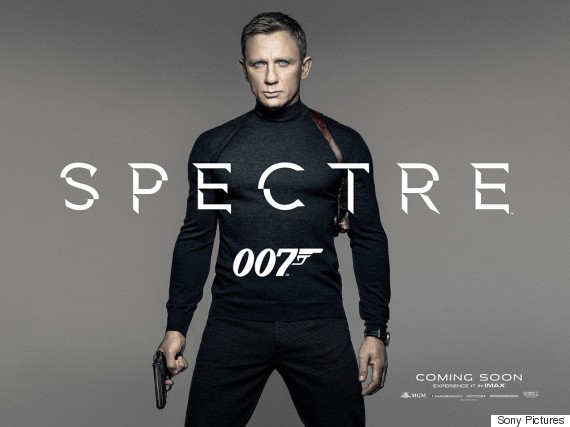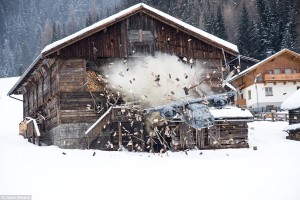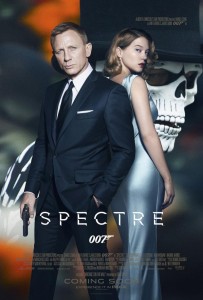Andrew Rostan was a film student before he realized that making comics was his horrible destiny, and he’s never shaken his love of cinema. Every week, he’ll opine on current pictures or important movies from the past.
This review doubles as a response to our critical brethren, who have developed the most polarizing reactions to the movie in question. Here is mine. SPECTRE, the twenty-fourth James Bond film and one of the most expensive movies ever made, is not that good. It is, in parts, downright bad. But it instantly became one of my favorite 007 movies, and one I will giddily rewatch again and again.
Why Sean Connery Could Have Been in SPECTRE
The most surprising thing about SPECTRE is what distinguishes it among the rebooted Bond films. This part of the franchise borrowed much from Jason Bourne and then from Christopher Nolan (who in turn had borrowed much from them). Now, despite working with several Nolan collaborators in the creative team, Sam Mendes and EON Productions have made a movie that recaptures the spirit of Sean Connery’s classic run and that singular gem On Her Majesty’s Secret Service.
First and foremost, there is a very basic plot: James Bond is given a mission and goes out investigating, with each new clue leading him to a new exotic locale until he finally discovers the villain and the plan…which here, after the lower stakes of the last few films, is once again world domination. In a move that recalls the Connerys, the pacing is mostly slow, allowing for expansive footage of Bond moving through landscapes and sets that allow for maximum scale and wonder as he puts the pieces together. Some may consider it boring, but I appreciated the stylistic emulation of Dr. No and From Russia With Love.
More importantly, the film is punctuated by six action sequences which delighted me with their classical feel. These are not the gritty, frenetic hurricanes of Fury Road (and that is not a criticism because we all adored Fury Road). These are cleanly shot, practical effects-driven scenes, none of which feel fake even with an invincible henchman (Dave Bautista!), plenty of gadgets, seven different vehicles (provided by the charming, hilarious Ben Whishaw as Q), the opening tracking shot, and the largest explosion in film history.
Finally, those disappointed that Roger Deakins did not return are being overly picky. Hoyte Van Hoytema, whose credits include Interstellar, her, and Let the Right One In, excels. He handles the epic and the intimate equally well, and his sense of formal composition is superb, filling the movie with mirrors and symmetrically arranged frames that accentuate the movie’s themes.
Power Trio
Beyond the production value, SPECTRE’s three key parts are played by what might be the best trio I could have imagined for a 007 movie.
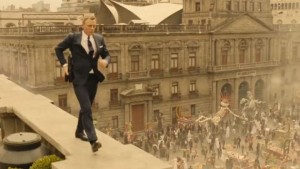 When I first saw the trailer, what struck me was how Daniel Craig had never seemed more confident as James Bond. His Bond now is not a rookie learning the hard way or an angst-driven man out for revenge but a man determined to succeed. Craig is still brutal and commanding, but he also finally allows the dry Bondian humor into his performance for the better, and all of it masks the nuanced introspection of a post-Skyfall Bond, forced to confront the realities of his past and present. Two other characters reflect his struggle.
When I first saw the trailer, what struck me was how Daniel Craig had never seemed more confident as James Bond. His Bond now is not a rookie learning the hard way or an angst-driven man out for revenge but a man determined to succeed. Craig is still brutal and commanding, but he also finally allows the dry Bondian humor into his performance for the better, and all of it masks the nuanced introspection of a post-Skyfall Bond, forced to confront the realities of his past and present. Two other characters reflect his struggle.
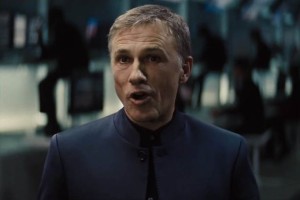 Semi-spoiler: this is a James Bond movie called SPECTRE and nobody runs SPECTRE except for Ernst Stavro Blofeld…and nobody alive could play Blofeld like Christoph Waltz. Delivering orders from the shadows and reveling in his own grandeur, Waltz owes much to Donald Pleasance’s iconic portrayal, right down to cavorting in a spectacular headquarters. But not even Pleasance shares Waltz’s gifts (and few do) for conveying menacing excitement, telling compelling non sequiturs, and walking right up to the edge of ham and pulling back. (Also, the new Blofeld origin story is heavily indebted to Ian Fleming’s books, a touch I appreciated.)
Semi-spoiler: this is a James Bond movie called SPECTRE and nobody runs SPECTRE except for Ernst Stavro Blofeld…and nobody alive could play Blofeld like Christoph Waltz. Delivering orders from the shadows and reveling in his own grandeur, Waltz owes much to Donald Pleasance’s iconic portrayal, right down to cavorting in a spectacular headquarters. But not even Pleasance shares Waltz’s gifts (and few do) for conveying menacing excitement, telling compelling non sequiturs, and walking right up to the edge of ham and pulling back. (Also, the new Blofeld origin story is heavily indebted to Ian Fleming’s books, a touch I appreciated.)
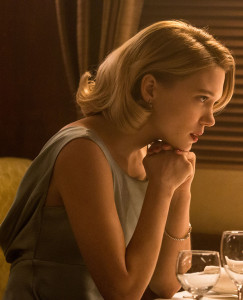 Finally, Lea Seydoux plays the wonderfully named Dr. Madeleine Swann. Seydoux is an amazing actress (exhibit 1 being Blue is the Warmest Color) and her Swann is almost perfect. She is intelligent, assertive, ready with her fists or a gun if needed, and has seen bad things—even done a few herself—and chosen not to engage with vileness anymore. Unexpectedly, Swann challenges Bond as much as SPECTRE. In the movie’s best dialogue-driven scene, Swann calls Bond out, decrying his dispiriting life as a paid assassin living in the shadows and stressing that people can change. When Pierce Brosnan was asked a similar question in GoldenEye, his Bond responded by sweeping the girl into bed. Craig’s Bond spends the rest of the movie trying to answer Swann, and he finally does in the film’s climax.
Finally, Lea Seydoux plays the wonderfully named Dr. Madeleine Swann. Seydoux is an amazing actress (exhibit 1 being Blue is the Warmest Color) and her Swann is almost perfect. She is intelligent, assertive, ready with her fists or a gun if needed, and has seen bad things—even done a few herself—and chosen not to engage with vileness anymore. Unexpectedly, Swann challenges Bond as much as SPECTRE. In the movie’s best dialogue-driven scene, Swann calls Bond out, decrying his dispiriting life as a paid assassin living in the shadows and stressing that people can change. When Pierce Brosnan was asked a similar question in GoldenEye, his Bond responded by sweeping the girl into bed. Craig’s Bond spends the rest of the movie trying to answer Swann, and he finally does in the film’s climax.
That said, the reason I call Swann “almost perfect” is bound up with the reason SPECTRE sinks.
The SPECTRE-Birdman Corollary
Like last year’s Best Picture winner, SPECTRE has four credited screenwriters, and also like Birdman, SPECTRE falls short of unqualified esteem because too many cooks create a bloody mess.
This is a shame because not only are the writers good—Neal Purvis and Robert Wade have worked on Bond films for sixteen years, while John Logan and Jez Butterworth are proven masters of modern cinema and drama—but they also create a really good story. However, their multitude of voices create a confused, botched execution and at times seem not to be listening to each other, cramming the film with more ideas than it needs. For instance:
*SPECTRE keeps leaving Bond to focus on the war between Ralph Fiennes’s M and the new intelligence chief C (Sherlock’s Andrew Scott) over how the world should use surveillance. All of these scenes are crammed with exposition and obvious moralizing and go on seconds longer than they need to, saved only by the magnetism of Fiennes and Naomie Harris’s Moneypenny.
*Bond seduces the grieving widow whose husband he killed so he can get a lead on SPECTRE. This part is so hurried that the action comes off as sport-screwing, and the great Monica Bellucci has nothing to do but moan and give in to 007’s sexual prowess.
*A few paragraphs ago, I called Seydoux almost perfect and that “almost” is not her fault; the writers decided that the very capable Swann needed to get captured by the bad guys TWICE and be rescued by Bond each time. The rescues are thrilling, but it’s an insulting, backwards plot element.
*Lastly, SPECTRE is treated so realistically that when the script goes over-the-top it feels incredibly jarring. Even a great disbelief-suspender like me was thinking “HOW did they cause the world’s biggest explosion?” “Did Q really get THAT much information from a DNA analysis?” and “WHERE are James and Madeleine storing those outfits?”
The James Bond Cinematic Universe – POTENTIAL SPOILER ALERT
All of these serious script flaws, and all of the virtues, pale before the film’s final revelation: that we spent the last decade watching a James Bond Cinematic Universe in which all the events of Craig’s tenure were linked together as a massive SPECTRE plot.
This decision has its problems. The explanation is almost too pat, and the plot would have justified a scene in which we would see Blofeld in flashback plotting with earlier villains. And because SPECTRE‘s execution is poor, the weighty themes it shares with Skyfall about what it means to have a surveillance state never get fully addressed.
In the end, I’m okay with this.
The overarching narrative makes Skyfall an even better film in my eyes than it was before by explaining why the action of that film was significant. It also connects the films in an emotional throughline.
This is very moving for me because James Bond didn’t get emotional arcs. He saved the world, period. OHMSS tried to shake up the formula and it was unfortunately considered a misstep. The modern Bond films keep the action and visual delight and formula trappings while addressing themes Ian Fleming rarely and the earlier films never did: what it means to work with confidential information in a world where that is the greatest power. Who you can trust. How you live a life protecting the masses knowing your mistakes and recklessness could kill thew. How this burden of uncertainty and responsibility creates a blunt misogynistic instrument…how it creates James Bond. And if such a man can change.
The confrontation between Bond and Blofeld and SPECTRE’s end, including a masterful final scene, tackles these questions and provides a poignant conclusion to an enthralling series.
If only they had spelled out what that acronym means, but one can’t have everything.
Pictures from the Daily Mail, Den of Geek, Flickering Myth, Huffington Post, Indiewire, and the Telegraph.

